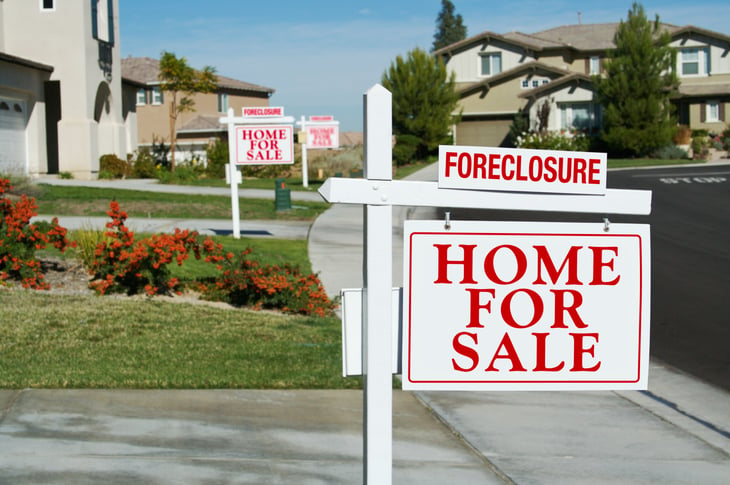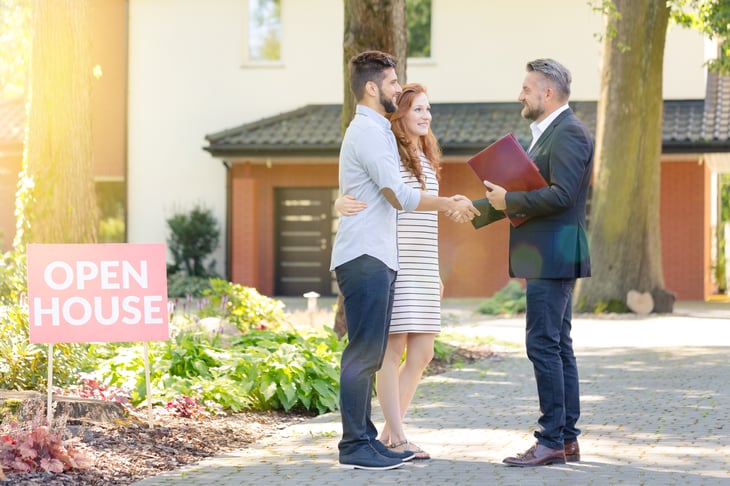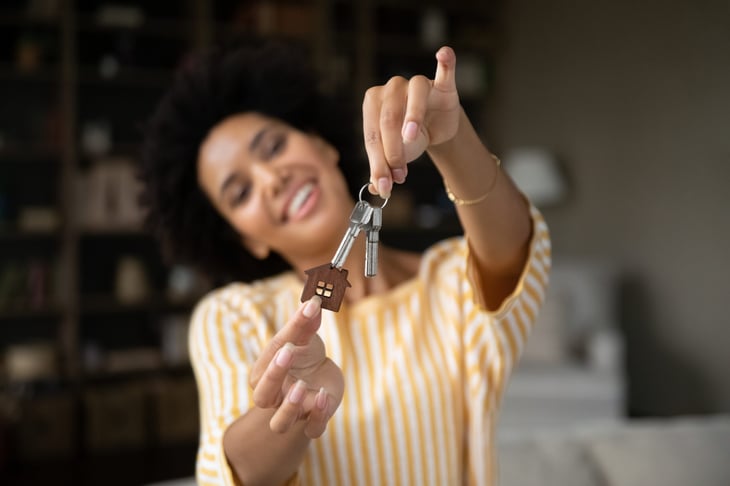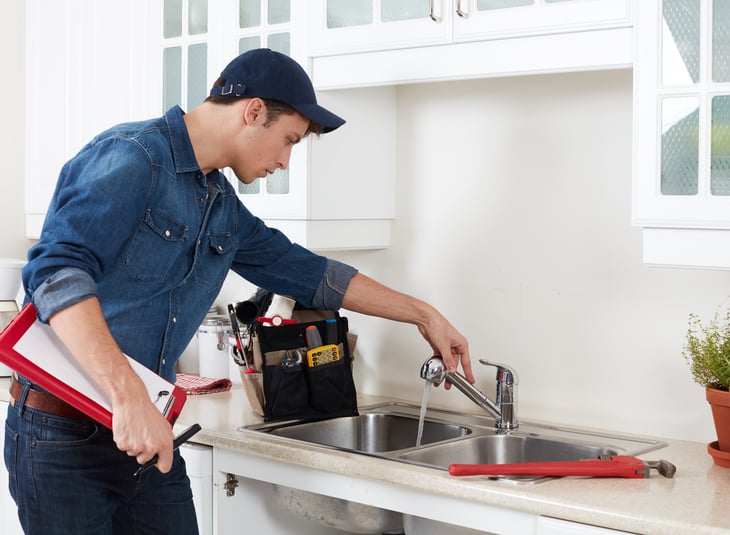
Editor's Note: This story originally appeared on Point2.
For many of us, buying a house is a huge, expensive milestone. To reduce the costs, you might be tempted by foreclosed homes.
Often seen as a more affordable alternative, you’ve probably heard stories of crafty investors making a hefty profit after snatching up a foreclosed bargain and flipping it.
But is buying a foreclosed home the right choice for you? It certainly comes with its own challenges, advantages and disadvantages.
With that in mind, let’s take a look at everything you need to know about how to buy foreclosed homes.
What Does Foreclosure Mean?

When a house is foreclosed, the owner has failed to keep up with their mortgage payments. With the owner defaulting on the loan, the lender begins the legal process of taking possession of the property.
They usually evict the former owner and attempt to sell the home to recoup their losses.
Since the lender is already losing money on the property, they’re generally looking to sell it as fast as possible. To save spending any more money, they’re usually unwilling to carry out any maintenance or repairs.
As such, the property will typically be sold “as is,” with very little room to negotiate.
Consequently, the lender’s desire for a fast sale of a house in its existing state results in the price often being lower than typical homes.
Two Ways to Buy a Foreclosed Home

When considering buying foreclosed homes, many people think they must bid for them at an auction.
However, while this is often the bank’s first choice, if the property doesn’t sell at auction, it becomes “real estate owned” (REO), sometimes known as “bank-owned property” in Canada.
In this case, the lender will hire a real estate agent to sell the home, similar to a typical sale.
How to Find Foreclosed Homes

While stocks may have shrunk in recent years, there are generally at least a few foreclosures on the market. Some of the most common methods of finding a foreclosed home include the following:
- Speaking to a real estate professional: The easiest way is to contact a real estate broker or agent and let them know you’d like to buy a foreclosed home. There are likely to be several opportunities that a broker may already be aware of.
- Specialized websites: Some platforms list only foreclosures, making it easy to see what’s available in your local market.
- Multiple Listing Services (MLS): Regular listing services will also often showcase foreclosed properties, though the status may not be immediately apparent and you’ll need to check the description.
- Printed press: Local newspapers and news websites often list foreclosed properties for sale, particularly upcoming auctions.
How to Buy a Foreclosure Home: 5 Top Tips

As we’ve seen, you have two choices when buying a foreclosed home: either bid for it at auction or take the more accessible and safer route of purchasing an REO foreclosure.
Here are a few tips.
1. Choose an REO Foreclosure

As a first-timer, and a buyer looking to live in the home you buy, it’s often best to avoid the auctions and look for REO foreclosures instead. There are a few reasons for this:
- Fierce competition: Auctions are typically attended by experienced real estate investors.
- Required to pay up-front: If you win the auction, you’ll be required to pay the total amount for the house up-front, either in cash or by check. There’s no opportunity to take out a mortgage to cover the cost.
- No chance to view: At an auction, you can’t view the property in advance or have a home inspection carried out. This presents a huge risk as you have no idea what you’re getting into.
So, while you’re more likely to bargain at an auction, the up-front costs and risks are very high.
Meanwhile, buying an REO foreclosure enables you to make an offer, take out a mortgage, inspect the home, carry out a title check, and view the property yourself, just like a regular sale. Plus, there’s still a good chance you’ll get to buy at a reasonable price.
2. Budget for Repairs

Like any real estate purchase, creating a watertight budget is essential. If you plan to purchase your foreclosed home at auction, you’ll also need to ensure you have the funds available immediately.
For REO purchases, you’ll be able to take out a mortgage as usual. Either way, be sure to put a good chunk of cash aside for repairs.
Many foreclosed homes need at least some repairs, and, in some cases, the required renovations can be costly. If you’re buying an REO foreclosure, be sure to have an inspection to see what you’re working with.
A renovation mortgage can be an excellent way for owner-occupant buyers to add a significant sum to their mortgage for repairs and renovations. If you’re buying at auction, have cash set aside for potentially huge renovation costs.
3. Work With a Real Estate Professional

An experienced real estate agent can make a huge difference when buying a foreclosed home. They’re familiar with the processes and the nuances and can provide invaluable insight throughout the process.
- They’re able to find more homes for you to consider.
- They can identify risks and problems that you might have missed.
- They can guide you through the entire process and know the local regulations.
Hiring a real estate agent is recommended for any house purchase, but it’s more important than ever for foreclosed homes.
4. Carry Out a Home Inspection and Title Check

It’s crucial to make the offer contingent on the home inspection and title check when buying a foreclosed home. Since many foreclosure properties were owned by people who couldn’t keep up with their mortgage payments, there’s a good chance they couldn’t keep on top of maintenance.
In many cases, the problems may only be minor repairs, but sometimes a home inspection can reveal huge renovation costs.
Of course, the house is likely to be sold as is, and it’s unlikely that any repairs will be made, but at least you know what you’re getting into, and you can walk away.
Having a title check is also essential, as foreclosed homes are often left with liens attached to them. These fees could be transferred to you if you’re not careful, costing you thousands of extra dollars.
5. Think Before You Finalize the Sale

With the home inspection and title check complete, as long as you made your offer contingent on these two things, the choice is now yours whether to go ahead with the sale or look elsewhere.
There’s typically little room for negotiation when it comes to a foreclosed home, but it can be worth trying in some cases.
If the home is free from major repairs or liens, you might have found your dream home at a fantastic price.
If, however, the inspection and title check reveal massive structural repairs that need doing or hefty unpaid fines, it’s a good idea to think whether it’s worth the risk and maybe reconsider.




Add a Comment
Our Policy: We welcome relevant and respectful comments in order to foster healthy and informative discussions. All other comments may be removed. Comments with links are automatically held for moderation.